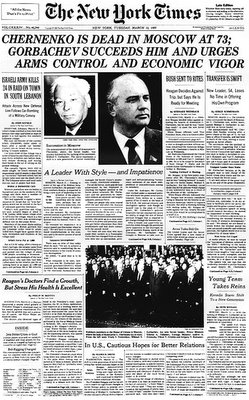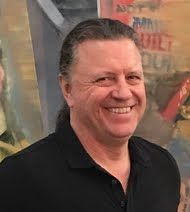Я живу, я вижу (I Live, I See) - March 10, 1985 Gorbachev Comes to Power

"And history will soon forget about you, but the heavens they will reward you."
-Nick Cave, "Faraway, So Close"
 Cassiel and Gorbachev in Wim Wenders' film - "Faraway, So Close"
Cassiel and Gorbachev in Wim Wenders' film - "Faraway, So Close" "Faraway, So Close" marked Mikhail Gorbachev's feature film debut. The guardian angel, Cassiel, looks over his shoulder while Gorbachev meditates that "a secure world can't be built on blood; only on harmony."
On March 10, 1985 after the death of Chernenko, Mikhail Gorbachev was appointed leader of the Soviet Union.
In 1988, Gorbachev began withdrawing Soviet forces from Afghanistan. More than 15,000 Soviet troops died during the Soviet invasion and occupation of Afghanistan (1979-1989).
Also during 1988, Gorbachev announced the end of the Brezhnev Doctrine, which had kept Eastern bloc nations under Soviet domination.
The Soviet Union's Foreign Ministry spokesman Gennadi Gerasimov jokingly described the decision as the Sinatra Doctrine, because Gorbachev's new policy allowed the Eastern bloc nations to "do it their way."
This led to a series of revolutions in Eastern Europe throughout 1989, during which the Berlin War fell and Soviet backed communism collapsed. These peaceful revolutions (except for Romania) effectively ended the Cold War.
Gorbachev was awarded the Nobel Peace Prize on October 15, 1990 for his loosening of the Soviet Union's post World War II domination of Eastern Europe.
Wim Wenders caught the magnitude of the moment and gave Gorbachev a role in the sequel to "Wings of Desire" - "Faraway, So Close."

Wim Wenders described how Mikhail Gorbachev appeared in "Faraway, So Close":
"I thought it would be impossible, but I wouldn't have forgiven myself if I hadn't tried. He's so essential to the reunification that his presence seemed important."
"So, I wrote him a letter, `Dear Mr. President . . . ' and sent it to the Kremlin, not really believing I would get an answer. But the letter got into the hands of his personal assistant, who was a movie buff and who had seen `Wings of Desire' several times."
"They said that Mr. Gorbachev would be in Berlin about six weeks later, and on a particular day when he could spare three hours, if we could talk him into doing it. So, we had the sets prepared and the actor (Otto Sanders, who plays the angel Cassiel listening in on Gorbachev's thoughts) — and this was before we began principal photography. But I didn't think we could get him to come again."

"So, Mr. Gorbachev came in and we talked for about 10 minutes. And by then he had seen `Wings of Desire' and really didn't have to be talked into it all that much. Shooting the scene was very easy, and he took direction really well, if I might say so. He was cool and collected — while Otto was falling to pieces, especially when he had to put his arm around Mr. Gorbachev."
"But the most beautiful thing was when Mr. Gorbachev recorded his thoughts. We had to get it done right away, of course, so we went into a quiet room with a microphone and I had prepared three pages from his own writings. I didn't dare to suggest to write Mr. Gorbachev's thoughts."
"But he had his own ideas and said, `I know what your thing is about,' and we just started to improvise for 20 minutes. He'd still be improvising if we hadn't run out of tape."
"He was quite amazing and astonishing."

0 Comments:
Post a Comment
<< Home